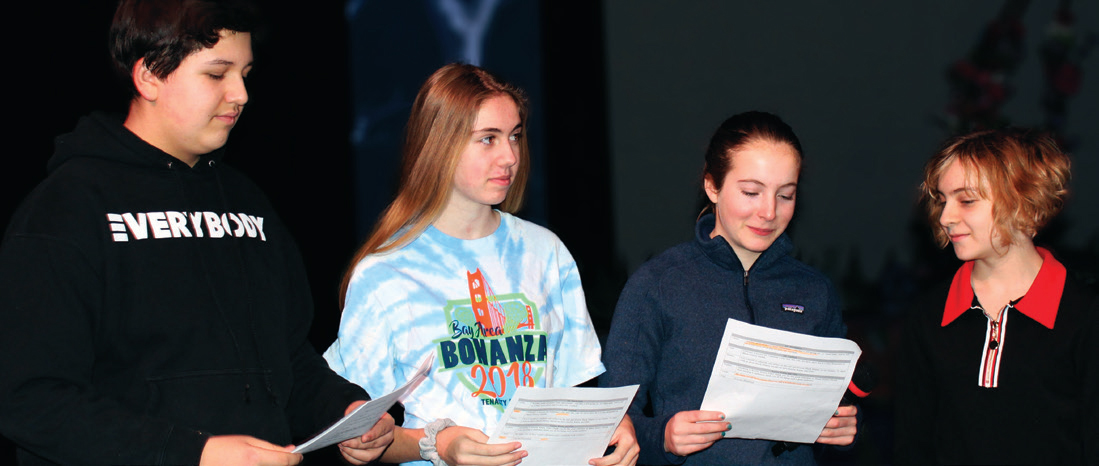
Above, Jamie Andrus with students in class.
EIGHTH GRADE: A YEAR OF INTENTIONAL LEADERSHIP
By Jamie Andrus, Learning Support Specialist
and Allison Luhrs, Literary Thinking Faculty
A THIRTEEN-YEAR-OLD STANDS WITH A MICROPHONE on the stage of the TALI Theatre, looking confident as she prepares to address the entire Middle School. When she speaks, the crowd goes silent, listening to her warm welcome to the day’s assembly. Many adults shudder at the thought of speaking publicly, but this eighth grader has the confidence and skills to hold the attention of her peers—and she’s only one of many students taking the opportunity to shine in assemblies this year. Like her peers, she is learning and practicing intentional leadership through our eighth-grade program, the Leadership Lab.
“Leadership Lab has been one of my favorite parts of eighth grade. It feels really good to know that when you go to Upper School you left something behind for the Middle School to make their experience better.”
One of the many goals of the Middle School is to prepare students for Upper School, and that preparation does not end with academics. The Eastside Prep Upper School has a robust Student Government that plans activities, leads initiatives, and supports school spirit; those in Student Government are leaders of the school. However, as Middle School Head Sam Uzwack noted at the beginning of the 2018–19 school year, leadership is not something students simply “know.” Students need to be taught about leadership attributes and ways of thinking, and then they need to be given “the chance to try low-stakes leadership opportunities that steadily progress.” It was with this idea in mind that EPS launched the Leadership Lab club this fall for interested eighth graders, and also implemented a stronger emphasis on leadership in the eighth-grade Advisory program. Intentionally teaching specific leadership skills students can practice in eighth grade will ensure students have the background and confidence they need to enter the Upper School ready to put their skills to work, and will also help students feel comfortable using their leadership in the classroom, on the court, and throughout life.
Unlike most Middle School clubs, which are student-proposed, the Leadership Lab was created through a collaboration between Uzwack and Student Life. It was advertised to eighth graders through assemblies and emails before commencing at the end of September. It was immediately apparent that students were eager for more opportunities to refine their leadership skills and make a positive impact on their school. Students participated in games and activities that highlighted the importance of clear communication and active listening skills.

Eighth-grade students prepare to present at a Middle School assembly.
After discussing what they appreciated about EPS as well as what changes they would like to see, students were introduced to a model to turn their vision into results. The model emphasized both the emotional and rational components of leadership, teaching that strong leaders set direction and execute plans but also engage others and sustain momentum. Members of the Lab settled on one initiative to pursue: clarifying the Middle School cell phone policy. At this point, there was a shift in leadership within the club itself as students were eager for their voices to be heard. As Lab member Brennan (’23) said, “We don’t just focus on what it means to be a leader, but we get started right away and we get to make changes in our school. I think it really is all about our mission statement and giving students a platform to make change in their school.” Students took it upon themselves to meet outside of club time. They used the vision-to-results model to develop a presentation that was first shown to Uzwack and then, at his request, to the entire Middle School faculty. The presentation was a resounding success, and students were praised for their thoughtfulness, clarity, and for their dedication to improving the EPS experience for both students and teachers.
While there is still work to be done finalizing the cell phone policy, the students in Leadership Lab have also adopted new initiatives. They often meet at lunchtime to discuss ideas and complete tasks, using their Friday club time as a chance to get feedback from teachers and hear about the work of other groups within the Lab. There is also already discussion about their reluctance to leave Leadership Lab behind when they continue on to Upper School next year. Kaitlyn (’23) says, “Leadership Lab has been one of my favorite parts of eighth grade. It feels really good to know that when you go to Upper School you left something behind for the Middle Schoolers to make their experience better.” The group is currently considering ways that they can carry their work forward into ninth grade.
Developing leadership is not only a goal for those who seek out opportunities, but for every student within the eighth grade. As the Grade Level Coordinator (GLC), Mike Anderson has spent a lot of time thinking about how to help students practice leadership. Anderson and David Kelly-Hedrick, the eighth-grade Social Emotional Learning (SEL) Coordinator, began by providing a framework for students to get involved in planning their own grade-level retreat in September. Rather than travel to a camp that plans activities for its visitors, students opted into groups to plan and lead their own activities at Fort Warden. They hosted games, reflections, and activities, with advisors present to provide support and guidance when needed. Anderson emphasizes that he and his team of advisors want to let students take risks and feel vulnerable, but with the knowledge that they’re not on their own and that even failures provide chances to learn and grow in their leadership.
When it came time to plan the annual Middle School Halloween party, the eighth graders had enough background in leadership to host an event not only for their own grade, but for the whole Middle School. They took over the first floor of the TALI parking garage, transforming it from a concrete hall into a horror-filled maze, candy-consumption arena, and costume-clad dance party. As Anderson notes, it’s important to “have the rest of the Middle School see the eighth graders having leadership opportunities as something to look forward to as they progress through the Middle School.”
Each eighth-grade advisory will also be planning and running a class meeting for their peers, each focused on one of the themes of eighth-grade leadership: listening, inclusivity, accountability, vulnerability/risk, or integrity. By spring trimester students will be ready to bookend their year with a second retreat to Fort Warden, where they’ll be able to draw on their fall experience to plan a second event—one that will undoubtedly bring their year of intentional leadership to a successful and memorable close.

